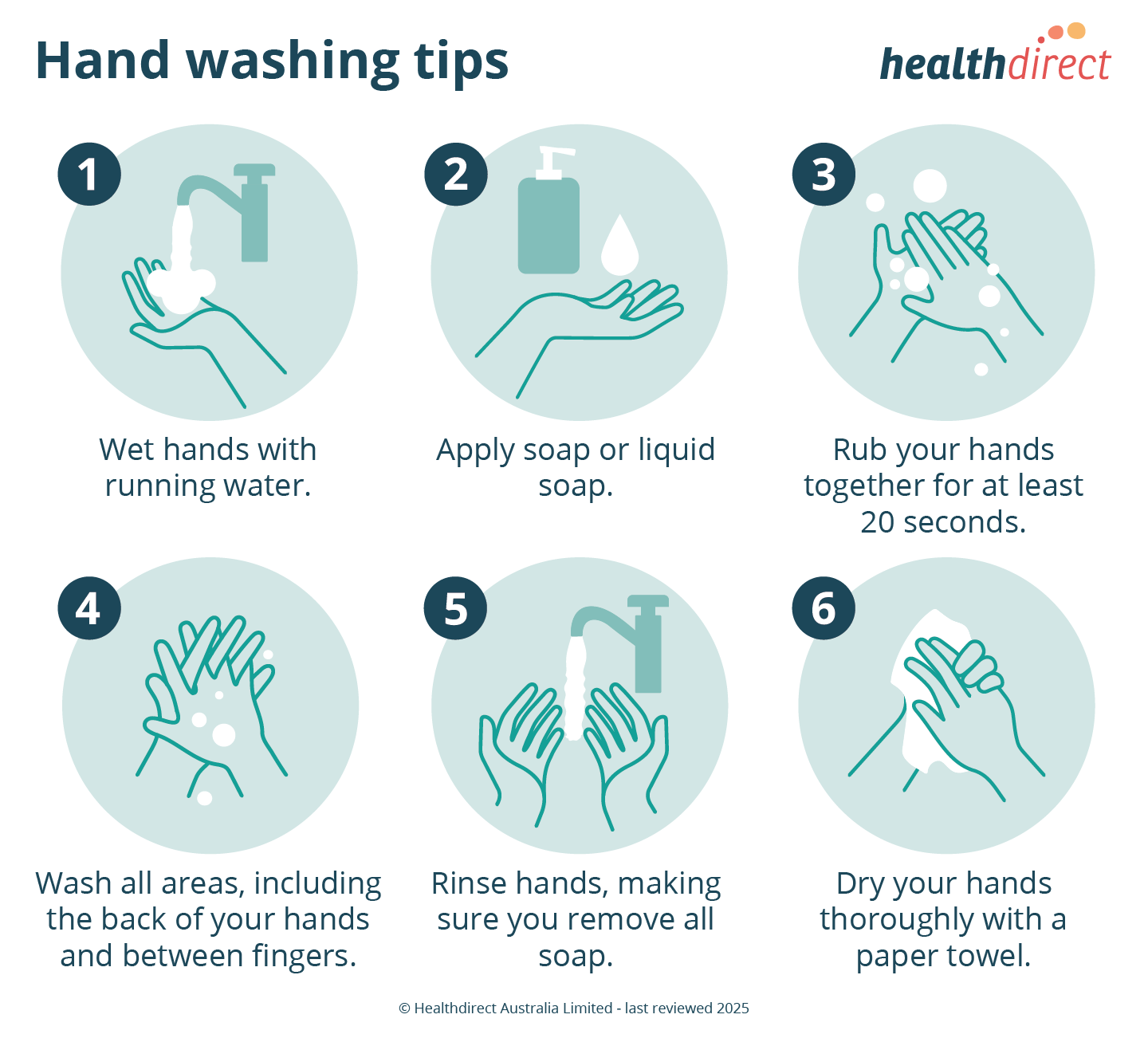Hand washing
7-minute read
Key facts
- Hand washing is important because it helps to prevent the spread of infections such as COVID-19, colds, the flu and gastroenteritis.
- You should wash your hands before touching anything that needs to stay clean, and after touching anything that might contaminate your hands.
- Warm, soapy water is the best option for washing your hands when they are visibly dirty.
- Hand sanitiser is only effective if your hands have no visible dirt on them.
Why is good hand hygiene important?
Germs collect on your hands as you go about everyday life. When you touch your eyes, nose or mouth, the germs can spread to these vulnerable areas. So one of the best ways to avoid getting sick and spreading illness is to frequently wash your hands.
Hand washing helps prevent the spread of infections such as common colds, flu, COVID-19 and gastroenteritis. This is important, especially if you care for babies, older people or sick people who are more vulnerable to these illnesses.
Babies and children need to wash their hands too. They’re more vulnerable to getting infections because their immune systems aren’t yet mature.
If your child is too young to stand at a hand basin, you can wash their hands with disposable wipes or a wet, soapy cloth. Always make sure all soap is rinsed off and their hands thoroughly dried.
Teaching children good hand hygiene sets up lifelong habits to stop the spread of infection.
Hand washing is also one of the most important ways to prevent the spread of infection among people in hospital. People’s immune systems are often weakened after illness or surgery, so infections are easy to catch and can be hard to treat. They may then become life-threatening.
When should I wash my hands?
You should wash your hands before touching anything that needs to stay clean. You should also wash your hands after touching anything that might contaminate your hands or make them dirty.
Examples of times when you should wash your hands include:
- when your hands are visibly dirty
- after going to the toilet
- after helping a child go to the toilet, or changing a nappy
- after handling rubbish, household or garden chemicals, or anything that could be contaminated
- before you prepare or eat food
- after touching raw meat
- after blowing your nose or sneezing, or wiping a child’s nose
- after patting an animal
- after cleaning up blood, vomit or other body fluids
- after cleaning the bathroom
- before and after you visit a sick person in hospital
- before and after touching a wound, cut or rash
- before breastfeeding or feeding a child
- before handling medicine or applying ointment
- when holding a sick child
What is the best way to wash my hands?
Warm, soapy water is the best option for washing your hands when they are visibly dirty. Follow these simple tips on good hand hygiene.
To wash your hands:
- Wet hands with running water (preferably warm).
- Apply soap or liquid soap — enough to cover all of your hands. Normal soap is just as good as antibacterial soap.
- Rub your hands together for at least 20 seconds.
- Make sure you cover all surfaces, including the backs of your hands and in between your fingers.
- Rinse hands, making sure you remove all soap, and turn off the tap using the towel or paper towel.
- Dry your hands thoroughly with a paper towel, a clean hand towel or an air dryer if you are in a public toilet.

When should I use waterless hand sanitiser?
An alcohol-based hand rub (hand sanitiser) is a good way to clean your hands if you don't have access to soap and water. Hand sanitiser is only effective if your hands have no visible dirt on them.
To use hand sanitiser:
- Put about half a teaspoon of the product in the palm of your hand, rub your hands together, covering all the surfaces of your hand, including between your fingers.
- Keep rubbing until your hands are dry (about 20 to 30 seconds).
Alcohol-based hand sanitiser can be poisonous if swallowed. Follow these tips to keep kids safe around hand sanitiser.

View text version of infographic
An alcohol-based hand rub (hand sanitiser) is a good way to clean your hands if you don't have access to soap and water, but it can be poisonous if swallowed. Follow these tips to keep kids safe around hand sanitiser.
Step 1 — store hand sanitisers safely and out of reach of children.
Step 2 — supervise the use of hand santiser by children.
Step 3 — be aware of imported products that may not be clearly labelled and may contain more toxic alcohols, such as methanol.
For advice on possible poisoning, contact the 24-hour Poisons Information Centre 13 11 26
Other tips for good hand hygiene
- Carry some hand sanitiser with you and use it whenever you want to decontaminate your hands, for example, after using public transport.
- Cough or sneeze into a tissue or your elbow, instead of into your hands.
- Wear disposable gloves before handling dirty nappies or cleaning up blood or any other body fluid.
- Be a good role model and encourage children to wash their hands properly and frequently.
- When using cloth towels to dry your hands, hang the towel up to dry after each use, and launder the towels regularly.
Learn more here about the development and quality assurance of healthdirect content.
This information was originally published on healthdirect - Hand washing.
Last reviewed: December 2023








